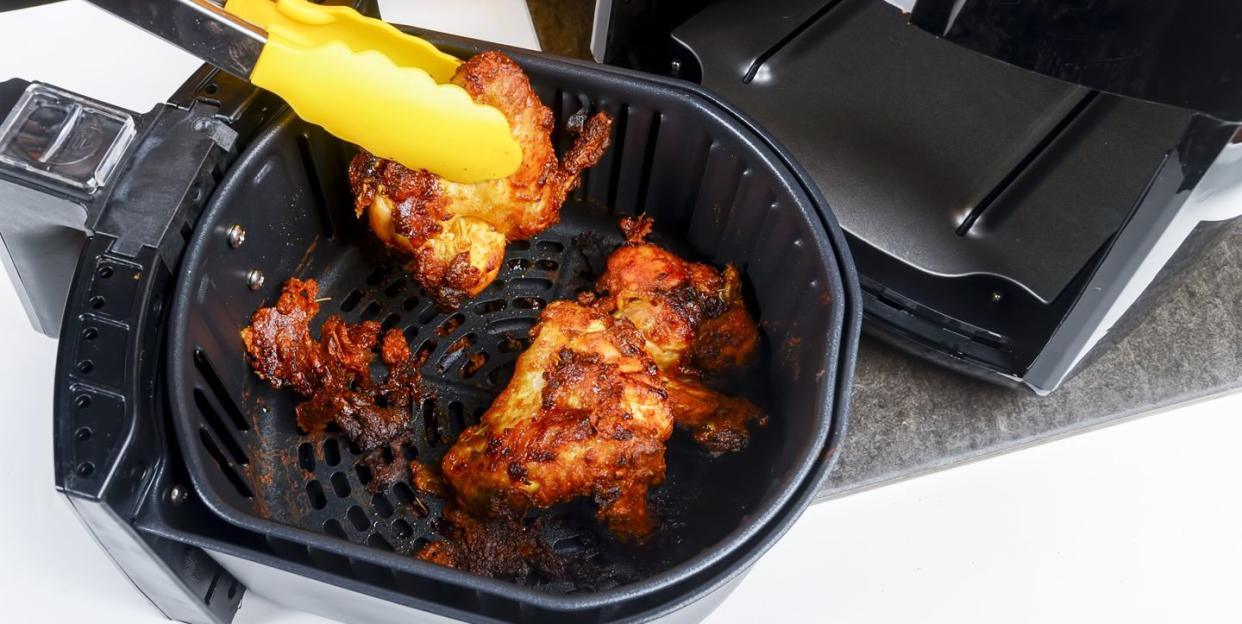If You Haven't Jumped on the Air Fryer Trend, You're Missing Out on Crispy (But Healthy) Foods

Air fryers are an internet favorite—they’re touted as an easy way to make some of your favorite, not-so-healthy foods (think: crispy fried chicken! golden French fries!) better for you—without sacrificing any of the deliciousness. But is that really true? Are air fryers actually healthy?
Here’s a look at how these trendy kitchen appliances work, whether air frying really is a better choice than deep frying, and if air fryers are truly the kind of thing that’s okay to use every day.
→ Get Bicycling All Access for the latest cycling and health news!
Benefits of Air Fryers
Air fryers can give food a crispy, crunchy texture with just a fraction of the oil that you’d need for deep-frying. That’s possible because deep fryers transfer heat to food via liquid fat. But air fryers transfer heat through convection, where a fan rapidly circulates hot air and sprays tiny oil droplets around the food.
“The hot air circulation and 360-degree exposure to food mimics the result of deep-frying by producing a crispy, browned layer,” explains Alon Chen, CEO and founder of the trend analysis firm Tastewise.
The convection mechanism means air fryers only need a tablespoon or so of oil (sometimes less, and sometimes none!) to give foods a just-like-fried texture. And since you don’t use much oil to begin with, it follows that air fried foods absorb considerably less fat than their deep fried counterparts. “Even pan-frying calls for several tablespoons to 1/2 cup of oil. And more fat equals more calories overall,” says Sarah Pflugradt, R.D.
Case in point: A deep fried chicken thigh will set you back around 250 calories and 19 grams (g) of fat. But an air fried one only has 135 calories and 5g of fat. And while that might not seem like much, if you eat deep fried foods a lot, it’s the kind of thing that can add up to a greater obesity risk or weight gain over time.
Air frying might also be a healthy way to help you avoid trans fats, the harmful processed fat that can raise your risk for heart disease and type 2 diabetes. Many restaurants deep-fry their food in trans fat-containing vegetables oils like soybean or canola. And reusing frying oil—whether at a restaurant or at home—has been shown to raise blood pressure and cholesterol and cause vascular inflammation.
There’s also the issue of carcinogens. Compared to deep-frying, air frying has been shown to produce significantly fewer acrylamides, harmful compounds that form when the amino acids in foods such as potatoes or bread are heated to very high temperatures. But when it comes to cooking meat, the high temps of both cooking methods have the potential to form compounds called polycyclic aromatic hydrocarbons (PAHs) and heterocyclic amines (HCAs), especially if the meat is burned. And all of these chemicals could increase the risk for cancer, according to the National Cancer Institute.
Overall, air fried foods tend to be lower in calories and fat than deep fried ones, which over time, could be a better thing for your waistline. But that’s just the beginning. Air frying can help you avoid trans fat and protect your heart health. It can also reduce your exposure to harmful compounds like acrylamides, which have been tied to cancer.
That’s not to say air frying is the most healthy or superior cooking method. It’s still better to eat more fresh fruits and vegetables and lean meats and protein every day. “I don’t believe air frying is meant to be used every day,” Pflugradt says.
[Gravel! prepares you with everything you need to know to crush it, including the best gear, how to train, and much more!]
According to Cleveland Clinic experts, the high temperatures used by air fryers mean that it’s still easy to char or burn your food, which could expose you to potential carcinogens like HCAs and PAHs. But more research is needed on these devices to determine if they are safe to use. “We can only assume air fryers are safe unless studies are done to prove otherwise,” Pflugradt says. If you’re worried about health, you should be focused on reducing your intake of deep fried foods and increasing fresh fruits, vegetables, lean proteins, and whole grains, with occasional air-fried foods in moderation.
So is an air fryer worth it? It depends. “If you usually deep-fry your foods, then air frying can be a great alternative,” says Pflugradt. Just be sure to use a heart-healthy oil like olive oil instead of vegetable oils such as soy or canola. And cook food to the point of doneness—but try not to let it burn. Additionally, you can use your air-fryer for all different types of cooking methods like you would a convection oven, so you may find value in that.
On the other hand, an air fryer probably isn’t worth it if you only have deep-fried foods every now and then. “I don’t see harm in indulging in your favorite foods every once in a while,” Pflugradt says—especially if you’re riding frequently. In other words, it’s fine to enjoy the occasional side of fries when you dine out as long as you stick mostly with healthy cooking methods—like roasting, baking, or sautéing—at home. Like all aspects of nutrition, everything in moderation is key.
You Might Also Like

